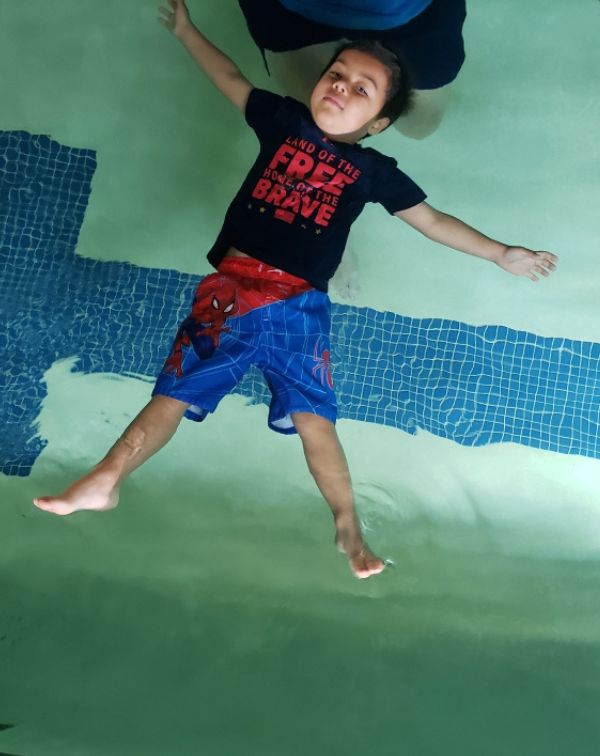About Survival Swiming
Survival swimming is a comprehensive swimming and aquatic self-rescue instruction. The method is clinically researched instruction emphasizing developmentally-appropriate skills training to ensure a child learns self-rescue skills and develops the competence required to enjoy the water. Integrated into the skills training of infants and young children is the ISR Parent Education program that seeks to enable parents and caretakers to understand drowning prevention methods and safeguard their child’s aquatic environment.
The next session for new survival infant swim participants is tentatively
January 2 – January 31, 2025: Enrollment form will be posted by the end of July. Please sign-up for emails or regularly check Facebook for updates.
*Please note this session is intended to train two Kodiak folks to become Survival swim instructors.
A Training instructor will manage the session, but our Kodiak folks will perform the in-water training.
When are lessons, how often, and how long?
The Kodiak session will tentatively start from August 19 to September 27, 2024. Lessons will not be held on Labor Day and will be made up on September 7th.
The fall session will have two sessions to accommodate 15 children in each session.
Each student will have an assigned private lesson scheduled in 10-minute increments.
The morning session tentatively meets at the City pool between 8:30 and 11:30 a.m.
The afternoon session tentatively meets at the City pool between 1:30 and 4:30 p.m. However, there is a possibility the afternoon session could be moved to the base pool, and/or the session times could change.
*Please note this information is to help folks have an idea of what is currently being scheduled. Dates/times can change and can only be confirmed by the ISR instructor and completed registration.
What are the age limits?
ISR Lessons are available to infants and young children six months (able to sit independently) to 6+ years old. However, the 2024 session will be limited to children under four who have not ever taken an ISR lesson.
How much does the 30 one-on-one lessons cost?
A TBD deposit will reserve your child’s spot in this session. The balance ($TBD) is due on TBD.
The separate ISR registration fee of $105 is paid directly to ISR. This fee covers the cost of the ISR registration evaluation team (RET) to complete a medical review of your child’s application to ensure the safest lesson for your child.
If you are interested in the lessons but need financial assistance, please still enroll but indicate in the form you will need help. Your name will be added to a list, and as funds become available, we will allocate as much as possible to your needs. Please know this does not guarantee your acceptance in the session until all lesson fees are covered.
What skills will the instructor focus on?
· Infants (6 months to 12+ months old) will learn to hold their breath underwater, roll onto their back, and float unassisted.
· Children (1 year to 4 years old) learn the following sequence: how to hold their breath underwater; swim with their head down and eyes open; roll onto their back to float, rest, and breathe; and roll back over to resume swimming until they reach the side of the pool and can crawl out or be rescued by an adult.
· Since statistics show that 83% of all children who drown are fully clothed at the time, during the final week of lessons, while under the watchful eye of an instructor, each of our students has the opportunity to practice their self-rescue skills in light and heavy clothing.
· No child will be thrown in the water.
Can we test my child's life vest?
Yes, it is recommended that if you boat or your child is using a life vest on the 6th week bring the life vest to test the effectiveness.
My child has special needs, can they participate?
Many children with special needs are able to safely and successfully participate in ISR lessons. Yes, you may register a child with special needs. ISR’s Registration Evaluation Team (RET) will review the registration information and provide guidance regarding ISR lessons for children with special needs.
What is the retention rate with lessons?
ISR claims a 94-100% retention rate for up to one year following lessons. Having said this, children will explore and may pick up bad habits, such as watching other children or with interference, like floating in a bathtub or playing on the steps. As your child goes through lessons, you will begin to understand, through communication with your Instructor, what activities may interfere with his/her learned Self-Rescue skills. Contacting and/or returning to your instructor in a timely manner is imperative to maintaining e!ective habits.
Do you have children that just can’t learn the skills?
No. Every child can learn. It is the Instructor’s job to find the best way to communicate the information so that it makes sense to the child. We set your child up to be successful every time. We start where they are. The number of lessons required to master ISR self rescue skills varies by child.

Why?
Does Kodiak need ISR?
- Kids don’t float, naturally, they will not float or turn themselves over in the water to rest on their backs, unless properly trained. Children under four do not have the body mass to keep their heads up out of water when they are on their stomachs for an extended period. When they get tired, their head falls into the water. Rolling to their backs is the only safe option for them to catch their breath.
- The number one cause of death for children under four is drowning. The number 1 state for children drowning in the US is Alaska.
- We’re on an island. Not just the ocean but the lakes and rivers cause a potential hazard for our children.
- Swim float swim is a program that teaches children four and under the lifelong skill of breath control in the water.
Fly-in vs. on-island instructor?
- Cost. Travel instructors not only have to pay for the expenses of traveling, but they also have to make enough to cover their at-home costs. So when the average session fee is $140 to $175 per child per week across the US. Kodiak is being charged $275 per child per week.
- The Kodiak money for traveling instructors is leaving the island.
- Missing follow-up training. Swim float swim is a survival skill; you must practice it like any other. After the 6-week session, children benefit by getting into the pool weekly to maintain their skills. Some parents don’t have it in their schedule to get in the water or maybe don’t feel comfortable in the water themselves to practice these skills. A steady instructor can help children maintain skills to build caution, confidence, and control in the water.
- Every six months, the child should undergo a two-week refresher course that refreshes existing skills and progresses skills to the next level. As a follow-up to the children who received training in fall 2023, the fly-in instructor offered to come out for a refresher. However, due to her limited availability to fly to the island, she could only get 7 out of 17 previous participants to fit into her schedule. Even after a generous citizen offered to cover flights and another citizen offered room and board, the instructor said it was not worth their time to come to the island for seven students.
Now?
- Every day, we have an untrained child in Kodiak, is a risk of a child drowning.
- To certify our Kodiak instructors, we need 20 to 28 children who have never been taught survival swimming. The more times we bring in an instructor, the smaller the pool of new students becomes available.
Community staple?
- Having an instructor on-island could give our children a lasting resource to develop caution, control, and confidence in the water.
- Children can have regular follow-up lessons to build life-saving skills.
What Families Are Saying
Questions? Join our Facebook community.
There is much information to absorb, and you might have the same questions as other caregivers. Consider joining our Facebook group to follow discussions about the upcoming session and efforts to make ISR a staple in our community.


Our ultimate goal is to bring ISR to Kodiak permanently. To do this, we need to organize and bring a Master ISR instructor for six weeks. This is a journey, and we hope you follow along on our Kodiak ISR Facebook to help make this happen.
